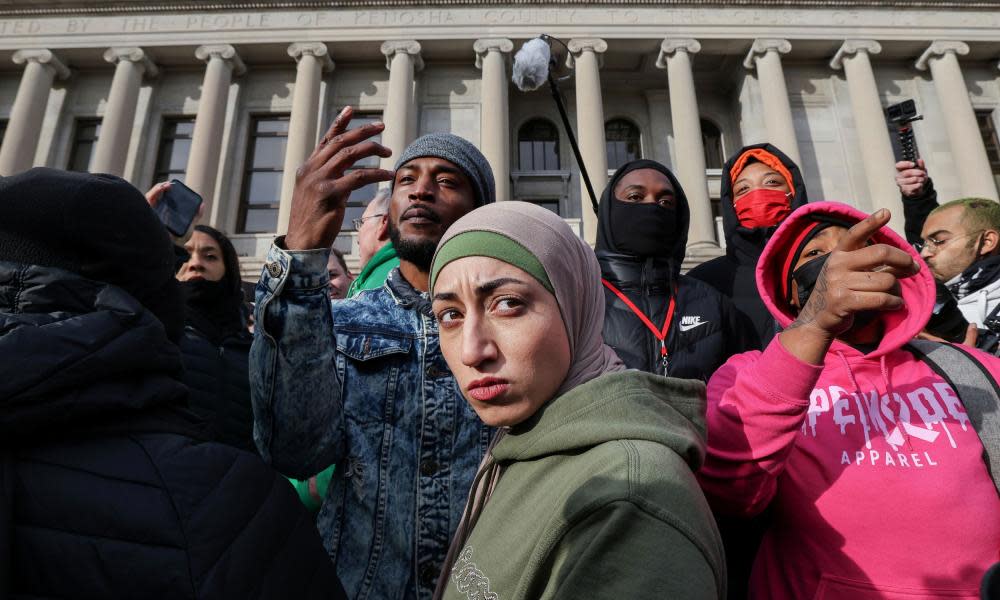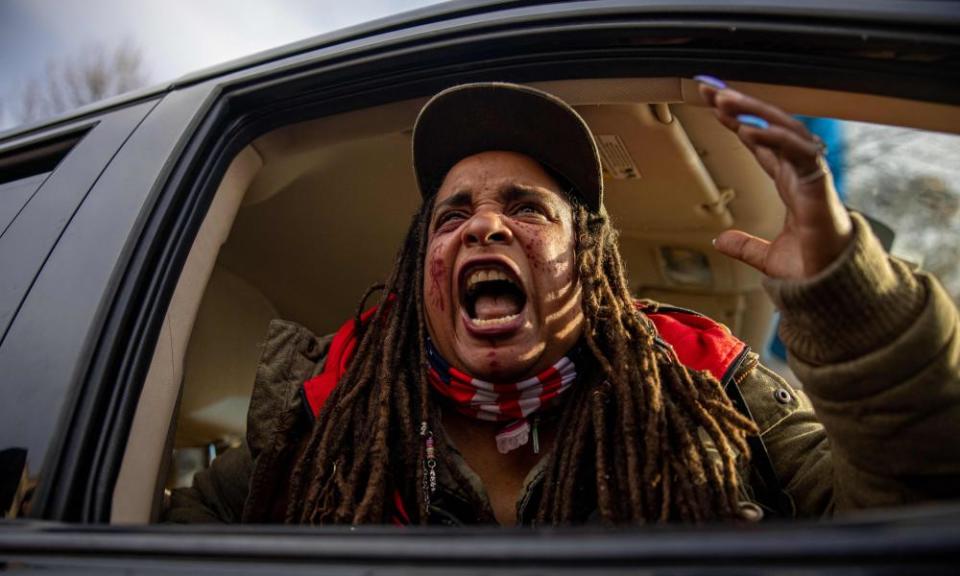As Kyle Rittenhouse walks free, Kenosha is left to pick up the pieces

Kyle Rittenhouse is now a free man after fatally shooting two men and wounding a third during anti-racism protests last year, but his trial has left behind a divided America – and done little to ease tensions in the city of Kenosha, Wisconsin, where the killings took place.
Rittenhouse, 18, who faced charges of homicide, was acquitted in full on the grounds of self-defense. But the jury’s decision did not calm the people outside the Kenosha county courthouse in the hours after news of the verdict rippled across the city, and the rest of the United States.
The shouting matches that flared on the courthouse steps between supporters of opposing sides embodied the wildly different lenses through which a divided America viewed the case.
On one side many saw the different treatment a white and armed militia supporter received from law enforcement when compared with anti-racism protesters. Meanwhile, conservatives hailed Rittenhouse a hero defending a city on fire, and raised money for his legal defence.
Those different world views played out across the US as Democratic and Republican politicians weighed in with statements that either condemned or supported the jury’s decision.

But on the streets of Kenosha the reaction was more immediate and visceral.
Drivers voiced their views from the open windows of passing vehicles. “Everyone go home!” shouted one man from his car. A Black woman raised her fist in solidarity with those protesting racial injustice, while a white man said nothing, but blasted “Celebrate!” from the window of his truck. Meanwhile, a small group of men atop the stairs chanted “Let’s go Brandon” – a coded jab at Joe Biden.
But aside from the jeers and heated debate, reactions in Kenosha remained largely peaceful, standing in stark contrast to the smoke-filled chaos that erupted on the nights of protest in August 2020 that left Joseph Rosenbaum and Anthony Huber dead and maimed Gaige Grosskreutz.
But what the jury determined to be a justifiable case of self-defense was viewed by many outside the courthouse as the latest example of a system biased toward white defendants and a legal system uncaring to Black deaths and injuries, after the violence had been sparked by the police shooting of a local Black man.
“When these types of things typically happen, we expect the worst but hope for the best. And today we saw the worst,” said Johnathon McClellan, the president of the Minnesota Justice Coalition.
McClellan, who came from neighbouring Minnesota for the case, pointed to judge Bruce Schroeder, Wisconsin’s longest-serving circuit judge, whose controversial statements and rulings have drawn scrutiny, and at times, rebukes from those watching the case.
Related: ‘A travesty’: reaction to Kyle Rittenhouse verdict marks divided US
McClellan and the Minnesota Justice Coalition are calling on the Wisconsin’s attorney general to recharge Rittenhouse with possession of a dangerous weapon by a person under 18, a misdemeanour charge that seemed a likely conviction for prosecutors until Schroeder dismissed the charge on Monday.
“I think that we need to have more legal professionals speak up and speak out because this isn’t what our system is supposed to be, irrespective of the process,” said McClellan.
Alana Carmickle, a 17-year-old from Kenosha, said she came to the courthouse straight from school after she heard the verdict because she wanted to represent the voices of teenagers who, she said, are not being heard.
“I’m not surprised, but I’m deeply, deeply upset by the verdict,” Carmickle, who is Black, said. “It’s very heartbreaking. It makes me question everything, including my own safety.
“Had Kyle been a Black boy or man, the verdict would be completely different. Everybody knows it … The whole country is watching our city fall apart. It’s now known for letting a killer go free.”
Brook Love, a 63-year-old from Milwaukee, said the outcome was typical of the racial injustice she’s seen throughout her life as a Black woman.
“What happened today is not right,” she said. “Any reasonable person can see that. People call this a judicial system. I call it a non-system, because most systems work. This non-system is not working. It’s a miscarriage of justice.
“If a person of colour would have shot those people, they’d be under the jail. There’s a double standard. How dare anyone call this a judicial system?”
But Kevin Mathewson, a former Kenosha alderman who in August 2020 put out a call on Facebook for civilians to take up arms and protect the city, had a very different view on the verdict – and the events that led to shooting.
“I’m just so relieved. I am filled with joy,” said Mathewson, who had been criticised for putting out a call to action that brought armed civilians like Rittenhouse to Kenosha.
Mathewson, who is white, like Rittenhouse’s victims, said the case had nothing to do with race, but instead a “fundamental right to defend oneself against somebody who wanted to kill you, or at the very minimum, do you great bodily harm”.
He described Kenosha as a lawless, dangerous place during the nights of protests in August 2020 and said the government showed through inaction it could not protect the city’s citizens. Fires burned, streetlights were torn out and police officers were attacked with bricks.
Related: ‘Two sets of laws’: racial tensions simmer in the town where police shot Jacob Blake
“We were on our own. So I went on Facebook and I said, ‘we need help. Arm yourselves, protect your neighbourhoods, your homes, your businesses. We need to do this because the government isn’t.’ That’s what I put out. And I stand by that,” Mathewson said.
In order for the city to move forward, everyone needs to accept the verdict and go back to living their “normal, everyday lives” – just like he had to do when Donald Trump lost the 2020 election, he said.
But a return to normal living, said Dayvin Hallmon, who served on the Kenosha county board for 10 years, is a continuation of the status quo that set the stage for the events of August 2020. Kenosha, in fact, is a city that has long suffered from the effects of a Black community feeling vulnerable and sidelined.
“The important thing is not the verdict here,” Hallmon said. “Focusing only on the verdict is scapegoating the real problem, which is the fact the opportunities for the young Black and brown residents of Kenosha are dismal as shit.”
Hallmon said for years he pushed his colleagues on the county board to rewrite use-of-force policies for law enforcement officers and pass resolutions to denounce violence. If Kenosha leaders were serious about moving forward from the past year, they’d be focusing on rooting out racism within the police department and listening to the city’s young people, who “feel like Kenosha is not for them and doesn’t want them”.
“If we focus only on the verdict here, this will all happen again,” he said.

